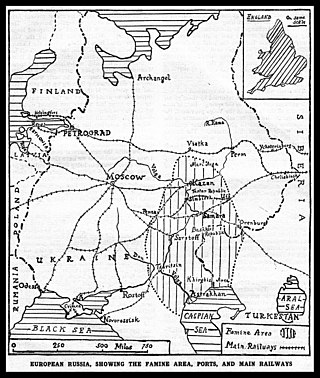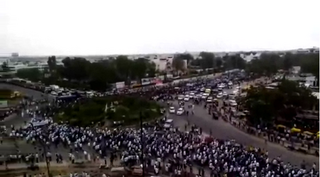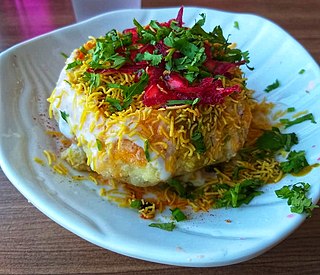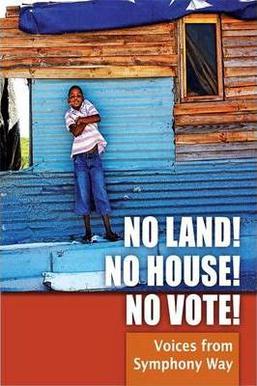
Vandana Shiva is an Indian scholar, environmental activist, food sovereignty advocate, ecofeminist and anti-globalization author. Based in Delhi, Shiva has written more than 20 books. She is often referred to as "Gandhi of grain" for her activism associated with the anti-GMO movement.

Starvation is a severe deficiency in caloric energy intake, below the level needed to maintain an organism's life. It is the most extreme form of malnutrition. In humans, prolonged starvation can cause permanent organ damage and eventually, death. The term inanition refers to the symptoms and effects of starvation. Starvation by outside forces is a crime according to international criminal law and may also be used as a means of torture or execution.

During the Second World War (1939–1945), India was a part of the British Empire. British India officially declared war on Nazi Germany in September 1939. India, as a part of the Allied Nations, sent over two and a half million soldiers to fight under British command against the Axis powers. India was also used as the base for American operations in support of China in the China Burma India Theater.

The Vietnamese famine of 1945 was a famine that occurred in northern Vietnam in French Indochina during World War II from October 1944 to late 1945, which at the time was under Japanese occupation from 1940 with Vichy France as an ally of Nazi Germany in Western Europe. Between 400,000 and 2 million people are estimated to have starved to death during this time.

Starved is an American television sitcom that aired for one season on FX for seven episodes in 2005. The series was about four friends who each suffer from eating disorders, who met at a "shame-based" support group called Belt Tighteners. Its characters included those with bulimia, anorexia, and binge eating disorder. Eric Schaeffer created the show as well as writing, starring in and directing it, based upon his own struggle with eating disorders. In addition to his own life experiences, Schaeffer also drew upon the experiences of the other members of the principal cast, each of whom coincidentally had struggled with food issues of their own.

The Russian famine of 1921–1922, also known as the Povolzhye famine, was a severe famine in the Russian Soviet Federative Socialist Republic that began early in the spring of 1921 and lasted until 1922. The famine resulted from the combined effects of severe drought, the continued effects of World War I, economic disturbance from the Russian Revolution, the Russian Civil War, and failures in the government policy of war communism. It was exacerbated by rail systems that could not distribute food efficiently.

Patidar, formerly known as Kanbi, is an Indian land-owning and peasant caste and community native to Gujarat. The community comprises at multiple subcastes, most prominently the Levas and Kadvas. They form one of the dominant castes in Gujarat. The title of Patidar originally conferred to the land owning aristocratic class of Gujarati Kanbis; however, it was later applied en masse to the entirety of the Kanbi population who lay claim to a land owning identity, partly as a result of land reforms during the British Raj.

Kachori is a deep-fried, spicy, stuffed pastry originating from the Marwar region of Rajasthan, India.
Vasna (Borsad INA) (sometimes spelled Wasna) is a town and an Industrial Notified Area of the Borsad municipality in Anand district in the Western Indian state of Gujarat.

The Southern bread riots were events of civil unrest in the Confederacy during the American Civil War, perpetrated mostly by women in March and April 1863. During these riots, which occurred in cities throughout the Southern United States, hungry women and men invaded and looted various shops and stores.

Rajeev "Raj" Patel is a British academic, journalist, activist and writer who has lived and worked in Zimbabwe, South Africa, and the United States for extended periods. He has been referred to as "the rock star of social justice writing."

A food riot is a riot in protest of a shortage and/or unequal distribution of food. Historical causes have included rises in food prices, harvest failures, inept food storage, transport problems, food speculation, hoarding, poisoning of food, and attacks by pests.

Agriculture in Venezuela has a much smaller share of the economy than in any other Latin American country. After the discovery of oil in Venezuela in the early 20th century to the 1940s, agriculture has declined rapidly, and with the beginning of large-scale industrial development in the 1940s, agriculture and land reform was largely neglected by successive governments. Since 1999, under the Bolivarian Revolution of President Hugo Chávez, agriculture has had a somewhat higher priority. Agriculture in Venezuela accounts for approximately 3% of GDP, 10% of the labor force, and at least a quarter of Venezuela's land area.
Eric Holt Giménez is an agroecologist, political economist, lecturer and author. From 1975 to 2002 he worked in Mexico, Central America and South Africa in sustainable agricultural development. During this time he helped to start the Campesino a Campesino Movement. He returned to the U.S. twice during this period: once for his M.Sc. in international agricultural development and then for his Ph.D. in environmental studies. His dissertation research was the basis for his first book Campesino a Campesino: Voices from the farmer-to-farmer movement for sustainable agriculture in Latin America. After receiving his Ph.D. with an emphasis in agroecology and political economy, he taught as a university lecturer at UC Santa Cruz and Boston University in the International Honors Program in Global Ecology. He gives yearly courses of food systems transformation and social movements in Italy in the Masters program of the University of Gastronomic Sciences in Pollenzo and in the doctoral program at the Universidad de Antioquia in Medellín, Colombia. His work has appeared in The New York Times, The Herald Tribune, Le Monde Diplomatique, La Jornada and The Des Moines Register. He has a blog on the Huffington Post.

West Coast Live (1985—2018) was a weekly two-hour radio variety show hosted by Sedge Thomson. The unscripted program features interviews with world-renowned authors and cultural figures along with performances by musicians, comedians and other entertainers. It is broadcast live-to-satellite each Saturday morning in front of a theater audience from one of several San Francisco Bay area venues. The show was carried on NPR stations from coast-to-coast, and in Paris, France until 2018. Occasionally, the show traveled to theaters, music festivals and film festivals throughout the northwest. The Biospherical Digital-Optical Aquaphone, is the "trademarked signature" of Sedge Thomson.

No Land! No House! No Vote! Voices from Symphony Way is an anthology published in 2011 of 45 factual tales written and edited by the Symphony Way Pavement Dwellers.
The Value of Nothing: How to Reshape Market Society and Redefine Democracy is a book by Raj Patel about the economic crisis and its effect on consumers. It was published in 2010.

Mughlai paratha is a popular Bengali street food consisting of a flatbread (paratha) wrapped around or stuffed with keema and/or egg. It is believed to have originated in the Bengal Subah during the time of the Mughal Empire as a derivative of the Turkish Gözleme. The dish is believed to be prepared for the royal court of Mughal Emperor Jahangir.
The Battle of Sialkot was fought between Durrani Empire and Sukerchakia Misl of Dal Khalsa in 1761.

Atlas Obscura is an American-based online magazine and travel company. It was founded in 2009 by author Joshua Foer and documentary filmmaker/author Dylan Thuras. It catalogs unusual and obscure travel destinations via user-generated content. The articles on the website cover a number of topics including history, science, food, and obscure places.















